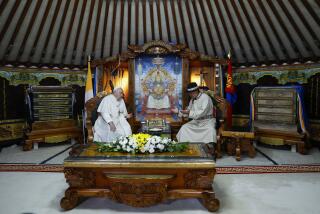Pope Exhorts Third World, Zimbabwe’s Youth
- Share via
HARARE, Zimbabwe — Pope John Paul II delivered powerful messages of support and encouragement for the Third World here Sunday as he toured the capital of a country whose president says he is a Roman Catholic and a Marxist.
Cheerful and orderly crowds of mostly black Zimbabweans shadowed the Pope’s passage around Harare, a pleasant city of 700,000 with a reputation of looking more like Iowa than Africa. Members of Zimbabwe’s small but economically potent white minority were equally welcoming. Greetings came from the Polish Assn., the Mashonaland Irish Assn. (founded in 1891) and the chief rabbi.
President Robert Mugabe, the 64-year-old Catholic-educated schoolteacher turned guerrilla, arrived in a gleaming black Mercedes-Benz and wearing a crisp black suit for a papal Mass at a suburban race track.
200,000 Worshipers
The Mass, celebrated to chants in English and Shona, the language of Zimbabwe’s largest tribe, attracted about 200,000 worshipers in what local journalists called the largest crowd since Zimbabwe became independent in 1980.
Later, at an exuberant rally in the national sports stadium, the Pope urged young Zimbabweans to help develop their country and promised to assist them.
“I shall continue to appeal for a new international economic order that will enable developing countries to expand their economic bases without accepting undue burdens or dependence on the more developed nations,” John Paul said.
In the last of his seven public statements Sunday, the Pope told the Harare diplomatic corps that it has “a vital role to play” in helping Africa defeat hunger and in caring for its many thousand refugees.
Such problems must be resolved, the Pope said, “in order for the world to find its proper balance in a new international order based on justice, solidarity and peace.”
Calls for Middle Path
In a recent encyclical, John Paul called for nations and individuals to pursue peace and social justice along a middle path between the extremes of capitalism and communism.
Mugabe is a Marxist who rules a one-party state, but his social policies have drawn praise from the Zimbabwean church for their dramatic successes in food production, public health, education and rural development.
After seven years as leader of a guerrilla army fighting to end minority-white rule in the breakaway British colony of Rhodesia, Mugabe became prime minister when his party won the 1980 elections held under the agreement by which the country became independent, black-led Zimbabwe. He became “executive president” as this year began, absorbing opposition forces into his own political party and vowing solemnly to undertake Marxist policies “so help me God.”
Mugabe, who intends to name a new rural school near his birthplace after his own earliest teacher, a Jesuit missionary, once said: “All the basic tenets of socialism which we espouse so fervently are at the core of the Christian philosophy.”
John Paul, whose entourage seemed impressed by what they saw on their first full day in Zimbabwe, turned to development as a theme after morning addresses in which he urged national reconciliation in a nation which has suffered both racial and tribal violence.
The Pope told the diplomats Sunday evening that they ought to encourage international lending agencies to tailor aid programs to African realities.
“The countries of Africa themselves must be in charge of their own development and historic destiny,” John Paul said. “Outside aid is urgently needed, but it will only be helpful in the long term if the essential force of growth and development is truly African.”
On the third day of his 10-day visit to five black African nations, John Paul journeys by plane to Bulawayo this morning for a round of ceremonies in Zimbabwe’s second largest city. He returns here in the afternoon, and then goes to neighboring Botswana on Tuesday.
More to Read
Sign up for Essential California
The most important California stories and recommendations in your inbox every morning.
You may occasionally receive promotional content from the Los Angeles Times.










